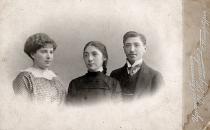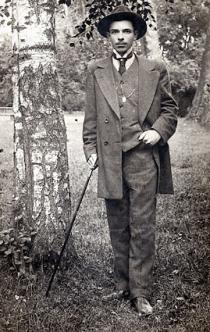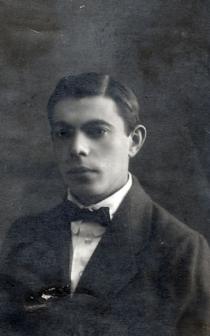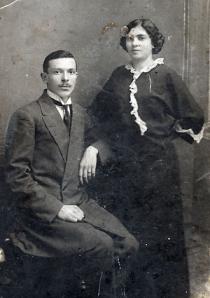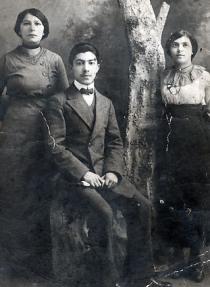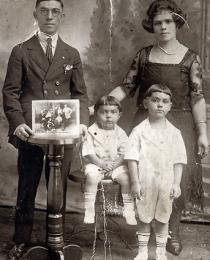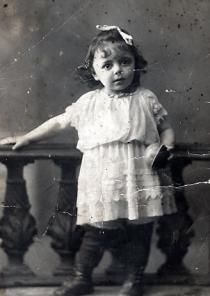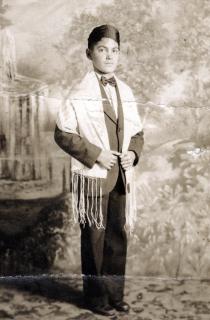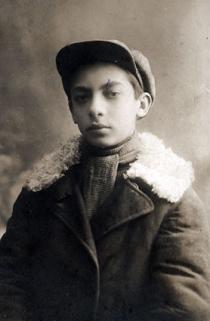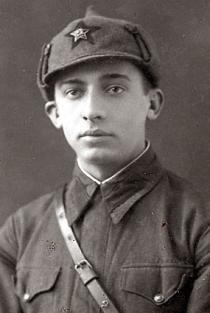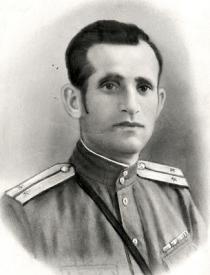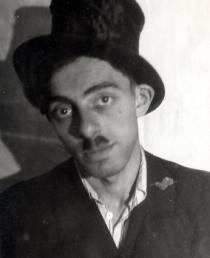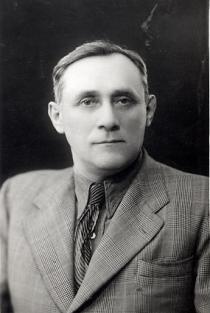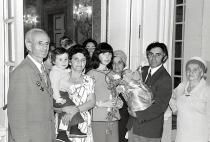Father's younger brother David is utmost to the right. Father's elder sister, Nina (Frida) is utmost to the left, Riva is in the middle. This photo was taken in Petrograd in 1915.
Grandmother Khotianova died in 1896, long before I was born. Her small children were left with Grandfather. There were five of them: the eldest brother Lev ; sisters Frida born in 1886 and Riva; my father Navtoliy [Anatoliy], he was the fourth to be born; and another brother, whose name I don't remember, I think it was David.
When Grandmother died, Frida was ten years old, and my father was five. I don't know the age of the other children.
Grandfather didn't want to marry again. He wasn't able to raise the children himself and gave them away to various families in order to teach them crafts.
He sent Lyova to a shoemaker, who made the upper parts for shoes; Frida found herself in the family of a seamstress and my father was given to a tailor's family. I don't know where the other children were raised. Grandfather left Vitebsk.
Aunt Frida worked as a seamstress in Vitebsk and later left for Petersburg for further study. She was very beautiful. At a ball she got acquainted with the son of Putilov, the owner of Putilovskiy Plant.
Putilov's son fell in love with her, but he couldn't marry a Jewess. She converted to Christianity and was baptized with the new name of Nina. Frida was baptized but remained a Jewess in her soul.
He concluded a marriage contract with her for 20 years. They got married in a church. She lived with her husband on Bolshoy Prospect at Petrogradskaia Storona. They had no children.
All this happened before the Revolution . When the Revolution of 1917 started, Putilov's son went abroad together with his father. Frida didn't want to leave. She stayed after the Revolution. She told me that she loved Russia very much.
However, deep in her soul she remained faithful to the Jewry. To be more precise, she had a Jewish soul. She never went abroad. I had a feeling that she was very beautiful, but not very clever.
Later Frida married for the second time. Her second husband was also from a good Russian family, some prince, but he was a real drunkard. I don't remember his name. He stayed in Russia after the Revolution because he loved his motherland. Once, Frida came to Vitebsk to visit us, when I was small.
Father's sister Riva was older than my father. She was born in 1888. Riva was very serious. She left Vitebsk for Moscow, studied at university and obtained an education.
She married an English Jew in Moscow. He was a socialist revolutionary. The younger brother of Riva and my father, who was also a revolutionary, introduced them to each other.
Together with Riva's husband-to-be they hid from the police, who wanted to arrest them. Riva lived in Moscow at that time and helped them.
Riva had a daughter from this Englishman. The daughter was older than me, she perished in Moscow during the war, in the course of the bombing.
During the war Riva remained in Moscow with her husband. After the war we lost contact with them. I know her English husband only from pictures.
I know very little about my father's younger brother. He was very attracted by revolutionary ideas when he was young. Then he left for Moscow and studied at university, but joined a revolutionary organization.
He always carried a gun and hid from police. He married a Jewess, who was also a revolutionary. He was 20 years old when he married that woman. She was much older than him. She had a 20-year-old son, his coeval.
They both studied at university in Moscow, he and her son. Father's younger brother died at a very early age. The 'revolutionary' brother and Riva, who married an English Jew, weren't religious.
Father loved his 'revolutionary' brother and Riva, but he didn't approve of their activity. They didn't meet and didn't visit each other. But Father always said that they have the right to live as they want. He loved them all very much.

